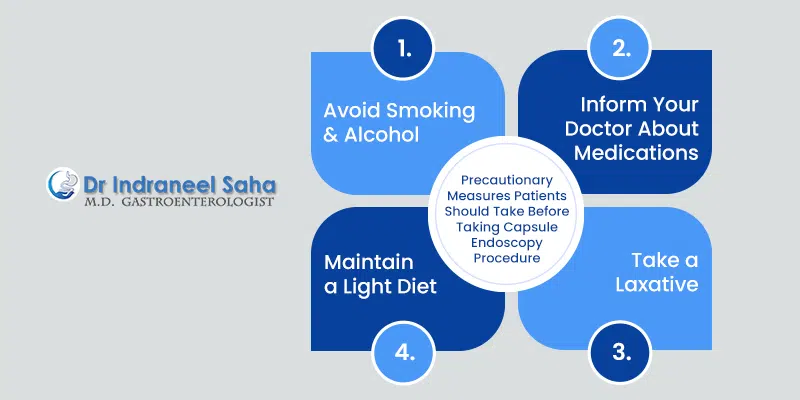- 11th Feb, 2025
- Capsule Endoscopy
Top 8 Questions About Capsule Endoscopy Answered
Capsule endoscopy has been one of the most effective procedures to examine the abnormalities in the small intestine. Compared to normal endoscopy, this approach has transformed the way gastrointestinal issues are diagnosed in recent years. The areas within the small intestine that were at once difficult to reach with normal endoscopy have been made accessible with this type of endoscopy.
The method is not only non-invasive in nature but is also a simple and safe procedure that is easily endured by patients. Moreover, it has become popular among surgeons due to its accuracy and precision.
Although widely used to treat gastro-related issues, people still have many questions about capsule endoscopy. In this blog, we will provide answers to some common questions about this procedure to clear the concerns of patients.
Capsule Endoscopy: Common FAQs
- How does capsule endoscopy work?
Capsule endoscopy is a procedure that looks for problems in the intestine. During the procedure, individuals are required to swallow a small-sized pill that contains a camera. As the tablet passes through the digestive system, it records high-resolution images of the lining of the whole GI tract, which are then transmitted to the recorder worn by the patient.
Within 24 hours, the capsule is naturally excreted from the body through bowel movements. The recorded pictures are then viewed by gastroenterologists to diagnose and treat the disorders. - What if the capsule gets stuck?
It is completely safe to what people think. However, at times, the pill might get stuck, especially in patients with a stricture in the digestive tract. Though rare, in capsule retention, you need to visit the doctor for a medical examination. If you experience unusual symptoms related to your bowel, you might be recommended surgery or a regular capsule endoscopy to get it removed. - Is the procedure safe for patients with pacemakers or other medical devices?
Capsule endoscopy is a completely safe and painless procedure for patients with implanted cardiac devices such as pacemakers or any other heart-assisted devices. Your doctor will examine your condition, and if required, he might adjust the setting of the pacemaker to minimise any chances of risks. - Is it possible to detect cancer with this endoscopy?
Yes, it is possible to detect bowel cancer with this examination. It can also detect other conditions such as colon polyps, Crohn’s disease, gastrointestinal bleeding and ulcerative colitis. - Are there any precautionary measures patients are required to take?
These are the measures that you will be advised to take by your doctor. Try to follow them for a smooth procedure.
- Make sure to stop smoking tobacco or alcohol for at least 24 hours before the procedure.
- Inform your doctor about any medicines for your underlying health conditions.
- Take a laxative to have clear bowel movements.
- Do not eat spicy or heavy meals the day prior to the examination.

- What is the duration of the method?
After the pill has been swallowed, the procedure usually takes one hour to complete. After the examination is done, patients are allowed to resume their daily activities. - Are there any risks involved?
It is a safe procedure only if it’s performed by an experienced doctor. In rare cases, complications include capsule retention, incomplete examination and technical complications. - When can one expect the results of the tests?
The result usually varies. After downloading the images from the recorder, it might take up to one week to get the results. If the test report is positive, your doctor might suggest additional tests for confirmation before starting the treatment.
Wrapping Up
If you are someone who needs to have a capsule endoscopy, make sure to understand the procedure, benefits and risks. If you have any concerns or doubts, consult a skilled gastroenterologist to determine if it’s the right procedure for you.